The EuroScience Open Forum (ESOF) is a biennial gathering of diverse participants from scientific, political, journalistic, and other backgrounds. The event provides a unique opportunity to share, discuss and debate the latest advancements in science as well as explore the ethical, regulatory, social, and political aspects of emerging technologies. I was fortunate to attend the event through a scholarship from the Elite Network of Bavaria and found my experience to be both educational and deeply inspiring.
Covid-19 & the Forum
The prestigious conference was originally scheduled for July, but due to Covid-19, it was rescheduled for September. Despite the postponement, the effects of the pandemic were still tangible, and it was clear a lot of effort had gone into ensuring safety. In order to enter the Trieste Convention Center, body temperature was checked at an automated kiosk which also dispensed hand sanitizer, and friendly staff ensured everyone had their masks on. As the event was hybridized to be both online and onsite, many participants and presenters attended virtually. While this put a damper on my networking efforts, it was nice to feel assured there would be no trouble getting a seat at the keynote talks!
The pandemic not only influenced the logistics at ESOF, but it also the content themes. In many of the sessions I attended, the discussion was related back to Covid-19, such as Covid-19 and sustainability. Or Covid-19 and science communication, e.g. fake news and the publics’ trust in scientific research. A repeated emphasis was made on the need for communicators to bridge the gap between researchers, politicians and the public. Interestingly, I heard more people in Germany were reported to have an increase trust in science following the pandemic, while in the United States there was notable increase in skepticism of science. The conversations were multifaceted, with data scientists, politicians, journalists, academics, researchers, citizens, and others contributing their unique angles to the dialogue.
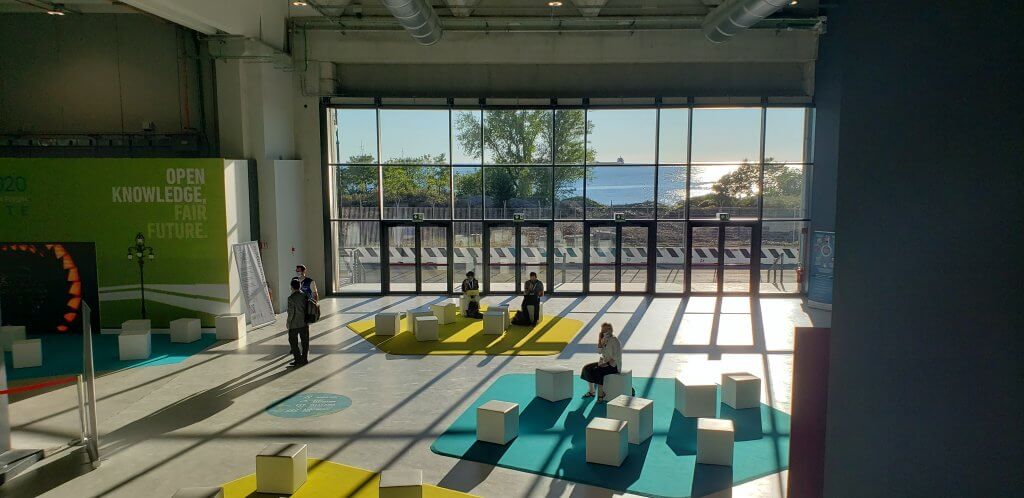
View of the smaller conference hall with the Gulf of Trieste visible through the window.
Decoding & Manipulating Genomes
I was particularly struck by the recurring themes of genetic engineering, genome editing, and CRISPR-cas9 technology. I worked previously for North America’s first third-party non-GMO verification program so I was glad I could follow the more technical presentations on the subject. There is much to discuss and seemingly limitless and promising applications, and many private and federal entities are making lofty investments. But what I find especially of interest is that there is no coherent ethical or regulatory framework in place to mitigate unintended or harmful consequences. The Convention on Biological Diversity is still discussing how to define organisms which are directly or indirectly the product of these technologies. There’s explicit acknowledgment of the rapidity in advancement, which makes it difficult to categorize or define, (let alone agree on and implement), ethical boundaries for testing and application—or containment and liability. What I gathered from the presenters and panelists is that we are not close to a comprehensible global framework for how to safely move forward in this domain. Still, that is not deterring the effort to explore this admittedly thrilling frontier of decoding and manipulating genetic information.
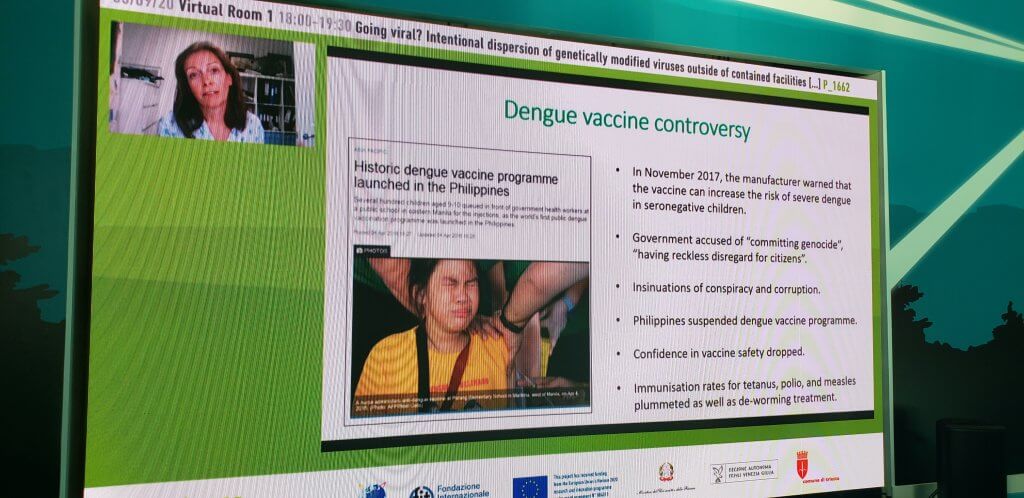
Slide from one of the several pandemic/genome related panel discussions. This one was titled “Going viral? Intentional dispersion of genetically modified viruses outside of contained facilities: are technological advances alone a sufficient explanation?”
Science in the City
While my days were spent at the convention center, my nights were spent exploring the Science in the City program, also organized by EuroScience. A highlight from the program was a traveling photographic exhibition of CERN (European Organization for Nuclear Research ) about the European large-scale particle collector. The exhibit included illuminated and colorful visuals with what I suspected were informative captions. I had never been so disappointed in myself for not being able to read Italian. Even though I could not understand the captions, the imagery was abstract, bright, and just fantastic.
What I also found remarkable about this exhibit was the way it pulled pedestrians away from whatever they were doing in order to engage with science. The exhibit was a terrific example of how science can be captivating; presented in such a way that stimulates intrigue and curiosity. It also helped that it was in the very lovely Unity of Italy Square, just across the street from sea’s edge.
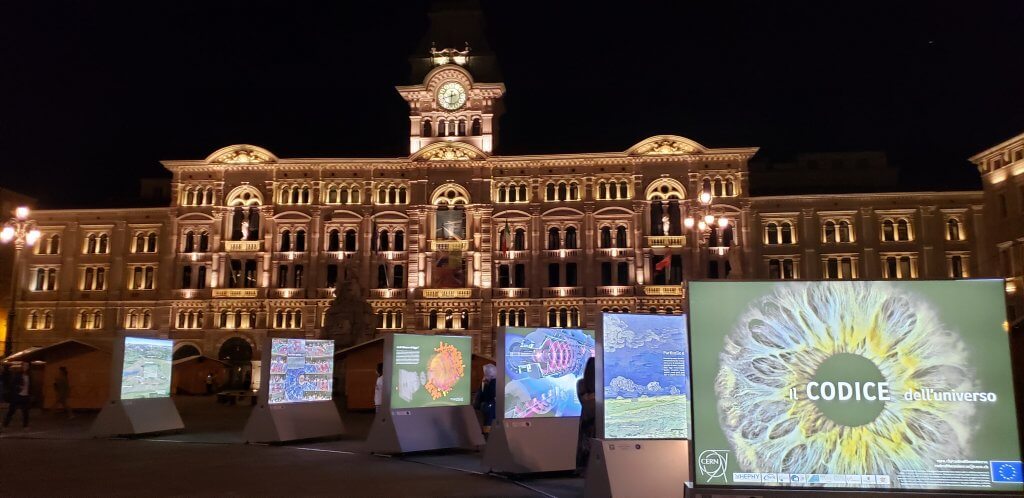
View of the CERN exhibit in the Unity of Italy Square
Quantum Information & Leiden 2022
At the closing ceremony, cyber security technology and quantum computing was the highlight. Quantum bits cannot be replicated which creates a challenge for amplification. But because they are not replicable, they are ideal for secure communication transmissions. I got a hefty download on the ins and out of quantum communication, but was also told that scientists from different nations are not necessarily sharing their progress in this field for national security reasons. Despite this, Italy’s Prime Minister Giuseppe Conte participated in the country’s first public demonstration of using encrypted quantum communication to make a video call. This was a big deal for Italy which I learned is a leading country developing this technology for Europe.
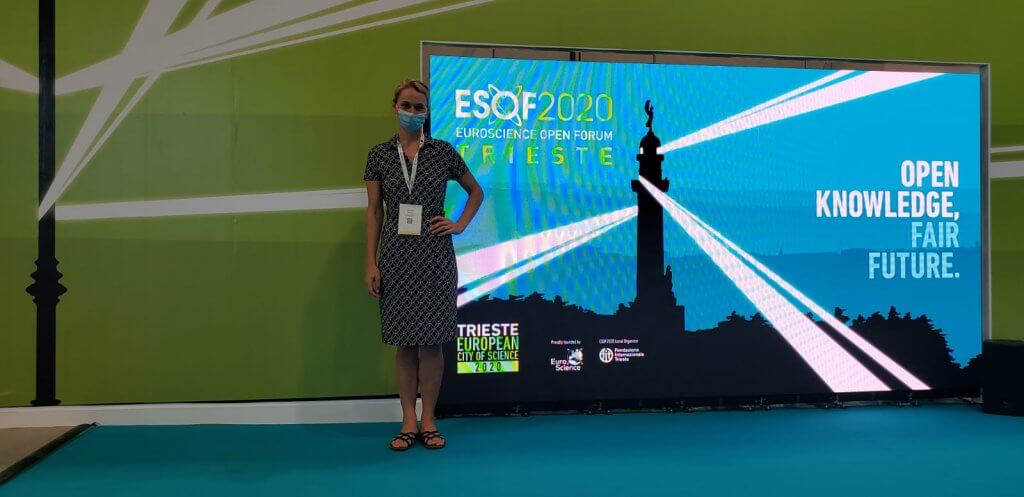
You cannot tell but I have a big smile under my mask!
ESOF was a highly valuable experience and with such a broad scope of topics, I could recommend this forum to anyone interested in life on planet Earth. I am not sure if it was the influence of Italian culture or the general culture of ESOF, but I experienced a heartfelt, passionate level of engagement from the speakers. They continually reminded the audience that scientists are dreamers and optimists, that it really is extraordinary what human collaboration and ingenuity can accomplish; and there is the real possibility for a peaceful, healthy future with, among other things, the support of science. Exposure to this level of sustained passion from senior scientists and leaders inspired me. As someone who is still determining what my next move will be following completion of the MSc Global Change Ecology program, ESOF was an insightful look into the multifaceted EU science scene. I am grateful to the Elite Network of Bavaria for the opportunity to attend this event as well as to the organizers of ESOF and the city of Trieste. Their efforts to host an excellent, hybrid science forum was exceptional, especially considering the circumstances.
After I completed this article, ESOF published an article on how Covid-19 influenced the program, including insight into some of the most current questions and considerations around the science of pandemics. For their full article, click here. Also, here is a link to download the program so you can see the topics of the sessions and speakers. ESOF2022 will be in Leiden, the Netherlands. Hope you can make it!

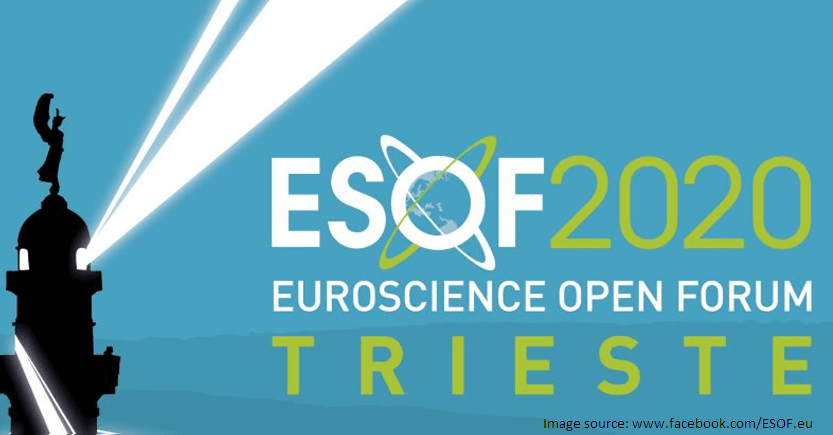








good topic
gooooooooooooooooood